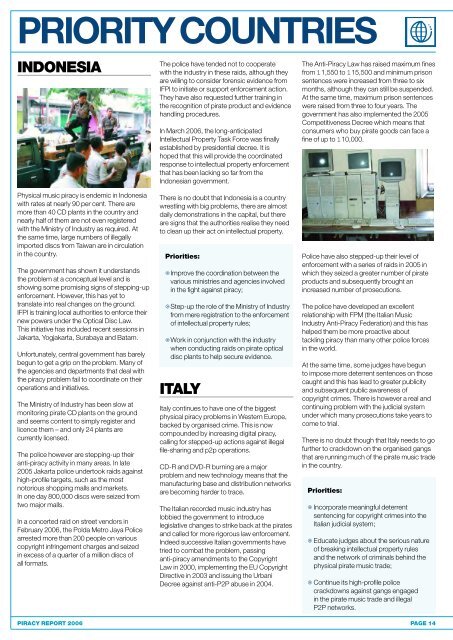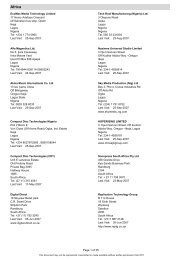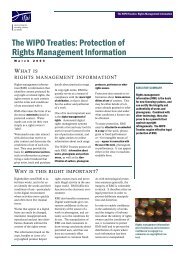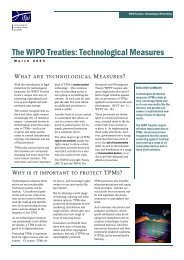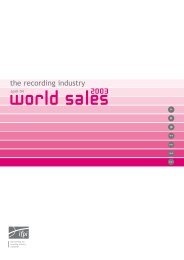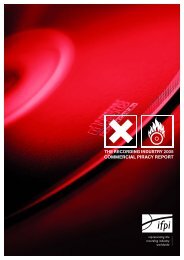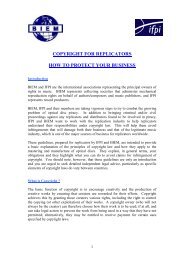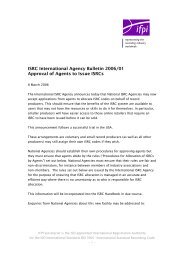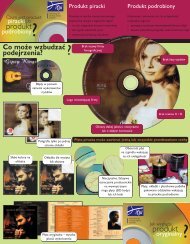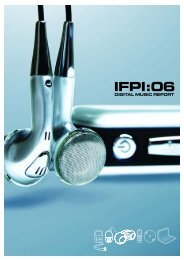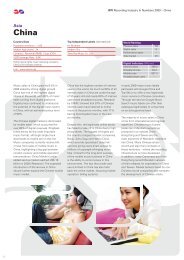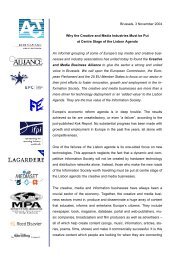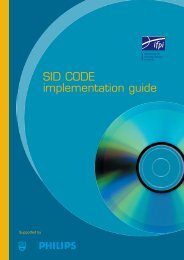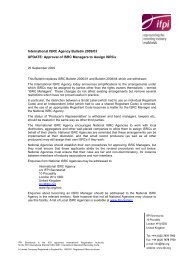the recording industry 2006 - IFPI
the recording industry 2006 - IFPI
the recording industry 2006 - IFPI
Create successful ePaper yourself
Turn your PDF publications into a flip-book with our unique Google optimized e-Paper software.
PRIORITY COUNTRIES<br />
INDONESIA<br />
Physical music piracy is endemic in Indonesia<br />
with rates at nearly 90 per cent. There are<br />
more than 40 CD plants in <strong>the</strong> country and<br />
nearly half of <strong>the</strong>m are not even registered<br />
with <strong>the</strong> Ministry of Industry as required. At<br />
<strong>the</strong> same time, large numbers of illegally<br />
imported discs from Taiwan are in circulation<br />
in <strong>the</strong> country.<br />
The government has shown it understands<br />
<strong>the</strong> problem at a conceptual level and is<br />
showing some promising signs of stepping-up<br />
enforcement. However, this has yet to<br />
translate into real changes on <strong>the</strong> ground.<br />
<strong>IFPI</strong> is training local authorities to enforce <strong>the</strong>ir<br />
new powers under <strong>the</strong> Optical Disc Law.<br />
This initiative has included recent sessions in<br />
Jakarta, Yogjakarta, Surabaya and Batam.<br />
Unfortunately, central government has barely<br />
begun to get a grip on <strong>the</strong> problem. Many of<br />
<strong>the</strong> agencies and departments that deal with<br />
<strong>the</strong> piracy problem fail to coordinate on <strong>the</strong>ir<br />
operations and initiatives.<br />
The Ministry of Industry has been slow at<br />
monitoring pirate CD plants on <strong>the</strong> ground<br />
and seems content to simply register and<br />
licence <strong>the</strong>m – and only 24 plants are<br />
currently licensed.<br />
The police however are stepping-up <strong>the</strong>ir<br />
anti-piracy activity in many areas. In late<br />
2005 Jakarta police undertook raids against<br />
high-profile targets, such as <strong>the</strong> most<br />
notorious shopping malls and markets.<br />
In one day 800,000 discs were seized from<br />
two major malls.<br />
In a concerted raid on street vendors in<br />
February <strong>2006</strong>, <strong>the</strong> Polda Metro Jaya Police<br />
arrested more than 200 people on various<br />
copyright infringement charges and seized<br />
in excess of a quarter of a million discs of<br />
all formats.<br />
The police have tended not to cooperate<br />
with <strong>the</strong> <strong>industry</strong> in <strong>the</strong>se raids, although <strong>the</strong>y<br />
are willing to consider forensic evidence from<br />
<strong>IFPI</strong> to initiate or support enforcement action.<br />
They have also requested fur<strong>the</strong>r training in<br />
<strong>the</strong> recognition of pirate product and evidence<br />
handling procedures.<br />
In March <strong>2006</strong>, <strong>the</strong> long-anticipated<br />
Intellectual Property Task Force was finally<br />
established by presidential decree. It is<br />
hoped that this will provide <strong>the</strong> coordinated<br />
response to intellectual property enforcement<br />
that has been lacking so far from <strong>the</strong><br />
Indonesian government.<br />
There is no doubt that Indonesia is a country<br />
wrestling with big problems, <strong>the</strong>re are almost<br />
daily demonstrations in <strong>the</strong> capital, but <strong>the</strong>re<br />
are signs that <strong>the</strong> authorities realise <strong>the</strong>y need<br />
to clean up <strong>the</strong>ir act on intellectual property.<br />
Priorities:<br />
gImprove <strong>the</strong> coordination between <strong>the</strong><br />
various ministries and agencies involved<br />
in <strong>the</strong> fight against piracy;<br />
gStep-up <strong>the</strong> role of <strong>the</strong> Ministry of Industry<br />
from mere registration to <strong>the</strong> enforcement<br />
of intellectual property rules;<br />
gWork in conjunction with <strong>the</strong> <strong>industry</strong><br />
when conducting raids on pirate optical<br />
disc plants to help secure evidence.<br />
ITALY<br />
Italy continues to have one of <strong>the</strong> biggest<br />
physical piracy problems in Western Europe,<br />
backed by organised crime. This is now<br />
compounded by increasing digital piracy,<br />
calling for stepped-up actions against illegal<br />
file-sharing and p2p operations.<br />
CD-R and DVD-R burning are a major<br />
problem and new technology means that <strong>the</strong><br />
manufacturing base and distribution networks<br />
are becoming harder to trace.<br />
The Italian recorded music <strong>industry</strong> has<br />
lobbied <strong>the</strong> government to introduce<br />
legislative changes to strike back at <strong>the</strong> pirates<br />
and called for more rigorous law enforcement.<br />
Indeed successive Italian governments have<br />
tried to combat <strong>the</strong> problem, passing<br />
anti-piracy amendments to <strong>the</strong> Copyright<br />
Law in 2000, implementing <strong>the</strong> EU Copyright<br />
Directive in 2003 and issuing <strong>the</strong> Urbani<br />
Decree against anti-P2P abuse in 2004.<br />
The Anti-Piracy Law has raised maximum fines<br />
from 11,550 to 115,500 and minimum prison<br />
sentences were increased from three to six<br />
months, although <strong>the</strong>y can still be suspended.<br />
At <strong>the</strong> same time, maximum prison sentences<br />
were raised from three to four years. The<br />
government has also implemented <strong>the</strong> 2005<br />
Competitiveness Decree which means that<br />
consumers who buy pirate goods can face a<br />
fine of up to 110,000.<br />
Police have also stepped-up <strong>the</strong>ir level of<br />
enforcement with a series of raids in 2005 in<br />
which <strong>the</strong>y seized a greater number of pirate<br />
products and subsequently brought an<br />
increased number of prosecutions.<br />
The police have developed an excellent<br />
relationship with FPM (<strong>the</strong> Italian Music<br />
Industry Anti-Piracy Federation) and this has<br />
helped <strong>the</strong>m be more proactive about<br />
tackling piracy than many o<strong>the</strong>r police forces<br />
in <strong>the</strong> world.<br />
At <strong>the</strong> same time, some judges have begun<br />
to impose more deterrent sentences on those<br />
caught and this has lead to greater publicity<br />
and subsequent public awareness of<br />
copyright crimes. There is however a real and<br />
continuing problem with <strong>the</strong> judicial system<br />
under which many prosecutions take years to<br />
come to trial.<br />
There is no doubt though that Italy needs to go<br />
fur<strong>the</strong>r to crackdown on <strong>the</strong> organised gangs<br />
that are running much of <strong>the</strong> pirate music trade<br />
in <strong>the</strong> country.<br />
Priorities:<br />
g Incorporate meaningful deterrent<br />
sentencing for copyright crimes into <strong>the</strong><br />
Italian judicial system;<br />
g Educate judges about <strong>the</strong> serious nature<br />
of breaking intellectual property rules<br />
and <strong>the</strong> network of criminals behind <strong>the</strong><br />
physical pirate music trade;<br />
g Continue its high-profile police<br />
crackdowns against gangs engaged<br />
in <strong>the</strong> pirate music trade and illegal<br />
P2P networks.<br />
PIRACY REPORT <strong>2006</strong> PAGE 14


